- Home
- Joel C. Rosenberg
The Twelfth Imam Page 4
The Twelfth Imam Read online
Page 4
Uprisings of support quickly erupted in cities throughout Iran, including Tehran, the political capital of the country, and Qom, the country’s religious capital with its scores of seminaries and other Islamic institutes. Large crowds of Khomeini supporters took to the streets shouting, “Khomeini or death!” The Shah imposed martial law the following day, but his forces overreacted, opening fire against Khomeini’s supporters. The official count of dead and wounded protesters was fifteen thousand.
Hosseini had never been to prison before then. He’d never been tortured. He’d never even imagined such a scenario. But he was not sorry for his friendship with the man responsible for his new fate. To the contrary, he counted it a great honor to suffer together with the great man for the sake of Allah.
For the next ten months, the two remained imprisoned together, but they could not have scripted events better if they had tried. Khomeini was becoming a national symbol of the Shah’s oppression of devout Muslims. He was steadily emerging as the leader of the Islamist opposition to the Shah, a role that suited him perfectly. And Hamid Hosseini was universally identified as one of the Ayatollah’s most trusted aides.
On April 7, 1964, Khomeini and his supporters were released, and major celebrations were quickly organized, particularly in Qom, where seminaries closed for three days to hold parties in his honor.
But the Ayatollah was not interested in parties. He wanted a revolution. He wasted no time in using his newfound fame and popular support to launch new, even more strident broadsides against the Shah. And Hamid Hosseini was again at his master’s side on October 27, 1964, when the imam delivered a speech that accused the Shah and his secularized government of treason and urged Shia Muslims throughout Iran to “come to the aid of Islam” by attacking the apostate, infidel regime.
“O Allah, they have committed treason against this country,” Khomeini bellowed to a crowd of thousands. “O Allah, this government has committed treason against the Qur’an. . . . They are not our representatives. . . . I dismiss them. . . . O Allah, destroy those individuals who are traitors to this land and traitors to Islam.”
On November 4, 1964, the Shah’s forces arrested Ayatollah Khomeini again and sent him into exile in Turkey. Hamid Hosseini, now a close friend and trusted aide to the imam, was exiled as well. But the two men could not have been happier. All the people of Iran saw Khomeini as the Shah’s leading opponent and Hosseini as his chief spokesman and confidant. And now they were free to make their case without fear of reprisals.
Turkey, at the time, was the epicenter of the reform movement within Islam. It was the place where Muslims adopted Western customs, dress, speech, and even democracy. It was hardly the appropriate base camp for the Ayatollah’s small band of Islamic radicals to plot the next steps of their revolution. They quickly made plans to leave Turkey for Iraq and arrived in Baghdad on October 6, 1965, accompanied by Khomeini’s son Mostafa.
Now, as Hamid Hosseini looked upon his dying master writhing in pain on a hospital bed, tears filled his eyes again, and he had to look away. He did not want to remember Khomeini like this, his life slowly fading.
In the fall of 1977, Hosseini had been at his master’s side when Mostafa had suddenly died under mysterious conditions. He had been in the room when the Iraqi medical examiner said his master’s forty-five-year-old son had died of a sudden and massive heart attack, but of this Hosseini had never been convinced. Far more likely, he was certain, was that Khomeini’s son had been assassinated by the agents of the Shah’s secret police, the SAVAK.
Now Hosseini convinced himself Ayatollah Khomeini was dying as a result of an evil plan. The doctors said it was cancer, but was it really? Perhaps the CIA had poisoned him. Maybe it was the Mossad. It might even have been a joint operation. He had no idea how they had done it. But he had no doubt the Great Satan and the Little Satan were behind Khomeini’s death, and he silently vowed they would both pay for their treachery. The Americans and the Zionists were still trying to smother the Iranian Revolution. But they would fail. With blood and fire, Hosseini vowed, they would fail.
Just then, Hosseini heard choking, gasping.
He quickly turned and stepped back to his master’s side, then stood paralyzed with grief as he watched the convulsions and the feverish efforts of doctors and nurses trying to stop the inevitable. But as suddenly as it had begun, it was over. The choking stopped. The gasping ended. The efforts to save him drew to a close.
Everyone in the room stood in horror, barely able to comprehend what they had just witnessed. The death angel had come, and Hamid Hosseini began to weep.
Hosseini faced Mecca, fell to his knees, and prayed silently.
But the prayer that entered his heart at that moment was one that surprised and terrified him. He had not planned to pray it. It just poured forth from his heart. It was a lament he had daily prayed as a child but one he never would have dared think—much less utter—within a thousand miles of the Ayatollah before now. It was a prayer that could have sent him to prison and the torture chambers had anyone close to his master ever guessed he was lifting it up to Allah. But he couldn’t help it. In his grief and despair, it simply became an involuntary plea.
O mighty Lord, he silently implored, I pray to you to hasten the emergence of your last repository, the Promised One, that perfect and pure human being, the one who will fill this world with justice and peace. Make us worthy to prepare the way for his arrival, and lead us with your righteous hand. We long for the Lord of the Age. We long for the Awaited One. Without him—the Righteously Guided One—there can be no victory. With him, there can be no defeat. Show me your path, O mighty Lord, and use me to prepare the way for the coming of the Mahdi.
7
Samarra, Iraq
The news swept through the Iraqi city of Samarra.
As word of Ayatollah Khomeini’s death spread through the Shia Muslim stronghold, it eventually reached Najjar Malik and hit him like a thunderbolt.
Only ten years old, Najjar had long been sheltered from national and world events by his uncle and aunt, who had taken him in after his parents’ deaths in a tragic car accident several years earlier. They didn’t let him watch television or listen to the radio. They didn’t let him read anything but his schoolbooks. For little Najjar, incredibly bright but also small for his age, life consisted of mosque and school and nothing else. If he wasn’t memorizing the Qur’an, he was memorizing his textbooks.
But today was different. Suddenly it seemed as if every Shia in Samarra had heard what Najjar had just heard from a woman shrieking in the hallway.
“The imam has died! The imam has died!”
Najjar was too much in shock to cry.
It couldn’t be true. It had to be a vicious rumor, started by the Zionists or the Sunnis. Ayatollah Khomeini was larger than life. He simply could not be dead. Wasn’t he the long-awaited Mahdi? Wasn’t he the Twelfth Imam, the Hidden Imam? Wasn’t he supposed to establish justice and peace? How then could he be dead if he was, in fact, the savior of the Islamic world and all of mankind?
Every Friday night for years, Najjar’s aunt and uncle made him listen to the latest audiotaped sermon from Ayatollah Khomeini that had been smuggled out of Iran and into Iraq. Then his aunt would tuck him into bed, kiss him good night, turn out the light, and shut the bedroom door. When the apartment was quiet, Najjar would stare out the window into the moonlight, meditating on the Ayatollah’s words and on his fiery insistence that a Muslim’s duty was to perform jihad—holy war—against the infidels. It wasn’t exactly the stuff of childhood dreams, but it stirred something deep within Najjar’s heart.
“Surely those who believe, those who wage jihad in God’s cause—they are the ones who may hope for the mercy of God,” the Ayatollah would declare, citing Sura 2:218 from the Qur’an. Jews and Christians are the ones whom God has cursed, he would explain, saying the Qur’an taught that they “shall either be executed, or crucified, or have their hands and feet cut off alternately, or be b
anished from the land.
“Kill them!” Khomeini would insist, pointing to Sura 9:5. “Wherever you may come upon them, and seize them, and confine them, and lie in wait for them at every conceivable place.
“The Prophet and his followers are commanded to wage jihad against the unbelievers and the hypocrites and to be stern against them,” the Ayatollah argued year after year, “for their final refuge is hell.”
Infidels, he insisted—citing Sura 22—will spend eternity in a blazing fire, “with boiling water being poured down over their heads. All that is within their bodies, as well as their skins, will be melted away.
“Have nothing to do with them,” he argued. “Don’t befriend them. Don’t negotiate with them. Don’t do business with them.” After all, he loved to say—citing Sura 5:59-60—“Allah has cursed the Christians and the Jews, and those whom he has utterly condemned he has turned into apes, and swine, and servants of powers of evil.”
Najjar had been transfixed by Khomeini’s courage and conviction. Surely this man must be the Mahdi. Who else could it be? he had wondered. True, his aunt conceded when Najjar occasionally asked innocent questions, Khomeini had not yet brought justice and peace. Nor had he yet established an Islamic empire that would transform the globe. But all this, she said, was just a matter of time.
Now what? Najjar thought. If Khomeini had really died, who would lead the Revolution? Who was the real messiah, and when would he come?
No one else was home, and Najjar felt scared and alone. Desperate to learn more, he fled his aunt and uncle’s cramped high-rise flat and ran down all seventeen flights of stairs rather than wait for an elevator. He ran out into the dusty street in front of their dilapidated building, only to find huge crowds of fellow Shias pouring out of their apartments as well. Seeing a group of older men huddled on a nearby corner near a fruit stand, smoking cigarettes and listening to a small transistor radio, Najjar ran to their side and listened in.
“Radio Tehran can now confirm that the revered imam—peace be upon him—has died of a heart attack,” he heard the announcer say in Farsi, the man’s voice faltering as he relayed the news. “The Supreme Leader of the Islamic Revolution has been in the hospital for the last eleven days. He was suffering from internal bleeding. But a government spokesman has confirmed what hospital officials indicated just a few minutes ago. Ruhollah Mousavi Khomeini is dead at the age of eighty-eight.”
Najjar’s mind reeled. How can the Promised One be dead? It was not possible.
With few other hard facts to report, Radio Tehran broadcast excerpts from Khomeini’s speeches. In one from 1980, Khomeini declared to his fellow Shias, “We must strive to export our Revolution throughout the world.”
Najjar heard a thunderous roar erupt from whatever crowd had been listening to the imam. He closed his eyes and pictured the scene and suddenly wished his parents had never left Iran. Perhaps then they would still be alive. Perhaps Najjar could have actually seen the Ayatollah with his own eyes. Perhaps he could have heard the master’s words with his own ears. Perhaps he could have even served the Revolution in some small way.
“The governments of the world should know that . . . Islam will be victorious in all the countries of the world, and Islam and the teachings of the Qur’an will prevail all over the world,” Khomeini bellowed in another radio clip. Najjar knew that line by heart. It came from a sermon the Ayatollah had delivered just after returning to Tehran, where he was greeted by millions of faithful followers shouting, “The Holy One has come! The Holy One has come!”
Disoriented by this turn of events, Najjar backed away from the crowd of men and out of earshot of the radio broadcast. He had heard more than he had wanted. His slight body trembled. His filthy cotton shirt was drenched with sweat, and he suddenly felt parched. He had no idea where his uncle and aunt were. But he desperately didn’t want to be by himself.
Perhaps they were at the mosque. He decided that was where he should be as well. He took off in a dead run for six blocks, slowing only when he could see the side door of the al-Askari Mosque just a few hundred meters away.
But suddenly, without warning, three teenagers—much larger than Najjar—came rushing out of the bushes and tackled him from the side. Blindsided, Najjar crashed to the ground with the wind knocked out of him. Before he could catch his breath, the three began beating him mercilessly. Two balled up their fists and landed blow after blow upon Najjar’s stomach and face. The third kicked him repeatedly in the back and the groin. He shrieked in pain, begging them to stop. He knew who they were, and he knew what they wanted. They were friends of his cousin, who owed one of them a few dinars. His cousin had been late in paying.
Soon blood was pouring from little Najjar’s broken nose and from his left ear. His face began to swell. His vision blurred. All colors began to fade. He was sure he was going to black out. But then he heard a voice shout, “Stop!”
8
Suddenly the beatings stopped.
Najjar didn’t dare open his eyes. Bracing for the next blow, he remained in a fetal position. After a few moments, he heard the boys walking away. Why? Where were they going? Was it really over? Mustering just enough courage to crack open one eye, Najjar wiped away the blood and tears and saw the three bullies standing around someone, though he could not tell who. Was it a parent? a policeman? Najjar opened the other eye. He wiped more blood away and strained to hear what was being said.
“The Holy Qur’an says, ‘Whomever Allah guides, he is the rightly guided,’” a commanding voice declared. “But what does the Prophet—peace be upon him—say of those who go astray, of those rebels who go far from the teachings of Allah? He says, ‘We will gather them on the day of resurrection, fallen on their faces—blind, dumb, and deaf. Their refuge is hell. And every time it subsides, we will increase their blazing fire.’”
Najjar knew that verse. His aunt had made him memorize Sura 17:97 on his fifth birthday, and it haunted him to this day. He scanned the crowd that had gathered, hoping to see a friendly face or at least a familiar one. But he recognized no one, and he wondered whether the mob was there to see a fight or a punishment.
“You’re saying we are all going to hell?” one of the bullies asked.
Najjar was surprised to hear a trace of real fear in the boy’s faltering voice.
“It is not I who say it,” the stranger said with quiet authority. “The Qur’an says, ‘The weighing of deeds on that day of resurrection will be the truth. Those whose scales are heavy with truth and good deeds, it is they who will be the successful. As for those whose scales are light, because of evil deeds, those are the ones who have lost their souls, causing them to travel toward the fire, because they mistreated; they knowingly denied Our signs.’”
Najjar knew that one, too. It was Sura 7:8-9.
He watched the shoulders of the teenagers sag. Their heads hung low. It wasn’t clear the boys had ever heard those verses before, but they certainly seemed to grasp the stakes. Suddenly they weren’t so tough or so cruel. Indeed, horrified by the wrath that could be awaiting his tormentors, Najjar almost felt sorry for them.
Since his earliest childhood, Najjar had deeply feared the fires of hell. He was convinced that his parents’ deaths in a car crash on a weekend trip to Baghdad when he was only four was punishment from Allah upon him for his own sins. He had no idea what sins he could have committed at so young an age. But he was painfully aware of all he had committed since. He didn’t mean to be such a terrible person. He tried to be a pious and faithful servant of Allah. He prayed five times a day. He went to the mosque every chance he could, even if he had to go alone. He had already memorized much of the Qur’an. He was often praised by his teachers for his religious zeal. But he knew the wickedness in his own heart, and he feared that all his attempts to do what was right could end up being for naught. Was he really any better than these boys who had beaten him? No, he concluded. He was probably worse. Surely they had been sent by Allah to punish him, and he knew he de
served it.
The three boys began backing away from their accuser. A moment later, they turned quickly and ran away. It was then that Najjar saw the one who had come to his defense, and he could not believe his eyes. The stranger was not a man but a boy—one not much older than he. He certainly wasn’t more than eleven or twelve years old, and he was short, with a slight build. He had jet-black hair, light olive skin, a pointed, angular, almost royal nose, and a small black spot like a mole on his left cheek. He didn’t wear street clothes like others his size and age. Rather he wore a black robe and sandals. But what struck Najjar most was the boy’s piercing black eyes, which bored deep into his soul and forced him to look away in humiliation.
“Do not fear, Najjar,” the strange boy said. “You are safe now.”
Najjar’s heart sped. How did the boy know his name? They had certainly never seen each other before.
“You are curious how I know your name,” the boy said. “But I know all about you. You are Persian, not Arab. Your first language was Farsi, though you also speak Arabic and French fluently. You grew up here in Samarra, but you were born in Iran, as were your parents and grandparents. Your family lived in Esfahān, to be precise.”
Najjar was stunned. It was all true. He searched his memory. He must know this boy somehow. But he couldn’t imagine where or when they had met. He had a nearly photographic memory, yet neither this face nor this voice was registering in the slightest.
“You are a child of the Revolution,” the stranger continued. “Your mother, Jamila, bless her memory, was a true servant of Allah. She could trace her family lineage to the Prophet, peace be upon him. Your mother memorized large portions of the Qur’an by the age of seven. She was excited by the fall of the Shah and the return of the Ayatollah from exile in Paris to Tehran on the fateful first day of February 1979.”

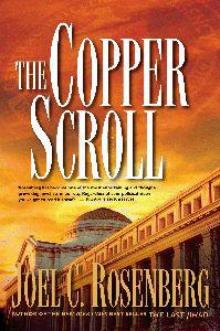 The Copper Scroll
The Copper Scroll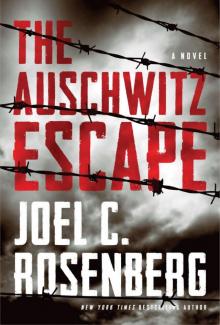 The Auschwitz Escape
The Auschwitz Escape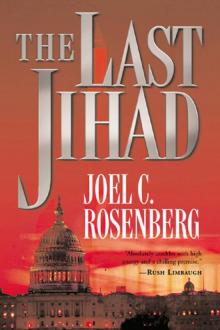 The Last Jihad
The Last Jihad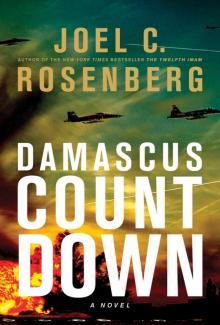 Damascus Countdown
Damascus Countdown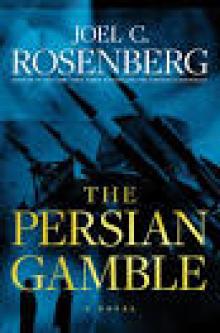 The Persian Gamble
The Persian Gamble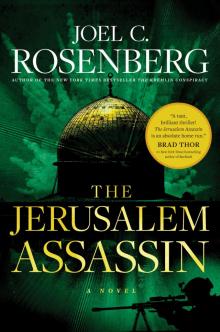 The Jerusalem Assassin
The Jerusalem Assassin Dead Heat
Dead Heat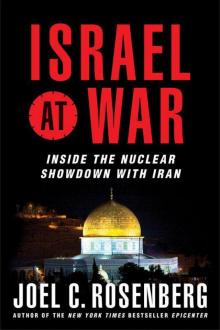 Israel at War: Inside the Nuclear Showdown With Iran
Israel at War: Inside the Nuclear Showdown With Iran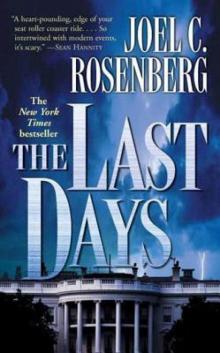 The Last Days
The Last Days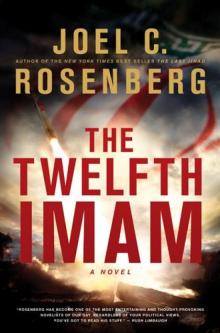 The Twelfth Imam
The Twelfth Imam Epicenter 2.0
Epicenter 2.0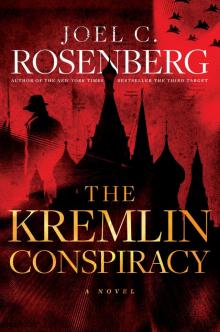 The Kremlin Conspiracy
The Kremlin Conspiracy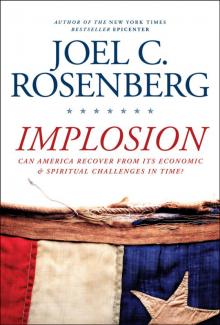 Implosion: Can America Recover From Its Economic and Spiritual Challenges in Time?
Implosion: Can America Recover From Its Economic and Spiritual Challenges in Time?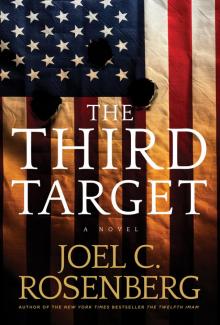 The Third Target: A J. B. Collins Novel
The Third Target: A J. B. Collins Novel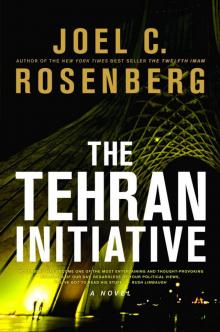 The Tehran Initiative
The Tehran Initiative Inside the Revolution
Inside the Revolution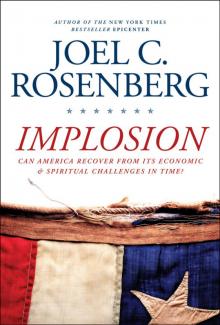 Implosion
Implosion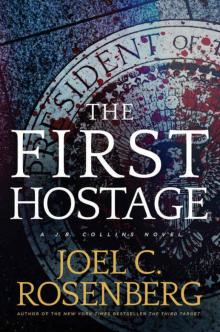 The First Hostage: A J. B. Collins Novel
The First Hostage: A J. B. Collins Novel